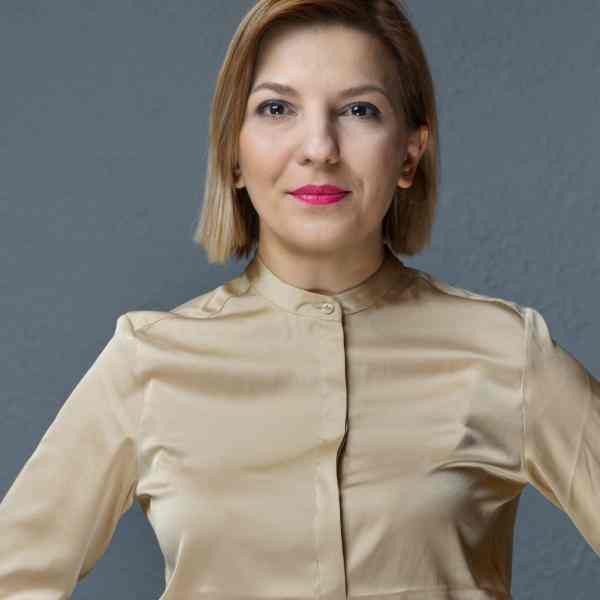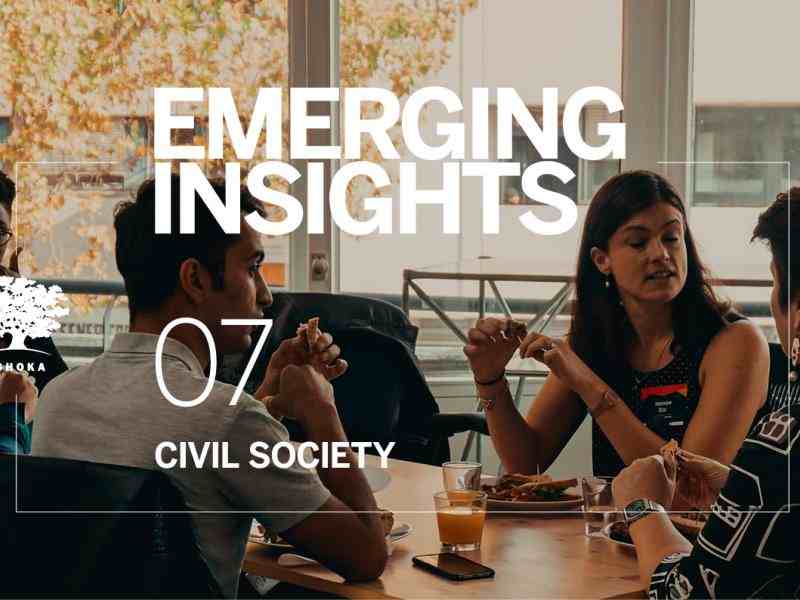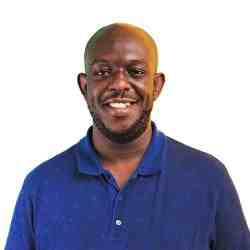Introduction
In a country with deep mistrust in politicians and policy-makers, with endemic corruption and clientelism deeply rooted in local culture and practices, with ineffective and unaccountable public administration, where civil society can easily become disengaged, Elena is using research-based, data-driven advocacy tools to build a citizens’ movement that strengthens citizens’ participation in public life.
L'idée nouvelle
Understanding the complex democratic system existing in Romania, Elena founded Funky Citizens to use technology, social media and non-formal education methods to facilitate the access to previously hard to find public information and to build the next generation of engaged Romanians who are “civically fit”. Having a fluid and agile organisation that is always looking for the gaps in society where nobody is intervening, Elena has managed to use a fresh tone of voice towards building a participatory constituency for democracy and public participation.
Strongly believing that you can’t expect people who struggle to cover their basic needs to fight for democracy and that it’s the duty of the middle class to take the reins of public accountability in the society, Elena has rebranded what citizenship is, made civic engagement mainstream and transformed it into a desirable, fun and aspirational way of life. Moreover, like physical fitness, getting and staying civically fit requires daily training and exercise. If individuals want to develop their civic fitness, they need to train their “civic muscles” by getting engaged in a variety of short-term assignments, in an easy-to-use framework, with the goal of setting long-term civic objectives (such as co-ownership of public spending, understanding the constitution and the roles and obligations of public institutions). By getting people to engage in online and offline activities (such as monitoring elections, signing petitions, reviewing public budgets) and by advocating for more open ways of participation (e.g.: making it possible for a party to be founded by 3 people, rather than 25.000), she has changed the society both bottom-up and top-down.
Elena sees herself as role model and galvanizer for the population and wants to make sure that people define their citizen role in democracy from an early age. Thus, “the nursery” is permanently producing generation after generation of “funky citizens” that will gradually replace the current activists. She combines a long-term solution (civic education, monitoring public spending), a short-term presence (fact checking), international plugging in (TransparenCEE, International Budget Partnership, International Fact-Checkers Association) and a strong constituency (citizens, media organizations, investigative journalists) to create irreversible societal change.
Le problème
After 30 years from the fall of communism, a new wave of illiberalism is capturing many countries, including Romania. Whilst populism, rising nationalism and attacks on open society values are global trends, their rise in post-communist countries pose even greater threats. In Romania, the political will to join European Union was the main driving force for reforms. However, nobody explained to citizens what this will mean. On the contrary, politicians used the transition to cover for their corruption, failure to deliver equitable development or good governance. The narrative given to the citizens was that they are a generation of sacrifice and that when we will join EU, everything will be perfect. Shortly after joining the EU, Romania was hit by the economic crisis and governments began to slowly go on a slippery slope towards more nationalism. At the same time, another reality was also alive and kicking: democratization does not stop when joining the EU. Civil society was not fully equipped for facing a reality in which funding for such interventions was no longer available from international donors, with many of the traditional NGOs dealing with promoting good governance becoming irrelevant or were forced to shift focus to other topics, because they lacked a constituency made of Romanian citizens, able to support them. Soon enough distrust in institutions creeped in and had an even more profound impact which led to disengagement from civil life and lack of ownership in public institutions activities.
Romania is perceived as one of the most corrupt countries in Europe, scoring 47/100 points in Transparency International’s CPI 2018, with only 3 countries having a lower score. In EIU’s Democracy Index 2018, Romania scores even lower, being perceived as the least democratic country in the EU. The democratic crisis is accompanied by demographic and social ones, with 3.4 million Romanians that have left the country in the last decade and with a low turnout rate of 39% for the latest general elections.
Citizens discontent with rampant political corruption started to articulate in 2012, when the first anti-governmental protests began, followed in 2013 by a civic movement against a gold mining project in Rosia Montana (a protest that began as an environmental one but which became mainstream when the ruling coalition wanted to pass a law for the sole benefit of the gold mining company). At the end of 2015, a fire broke in a night club in Bucharest and 65 young people died, an incident marked by the effects of corruption which led to massive protests, so the government resigned. The civic awakening continued and when in 2017 the newly installed government passed an emergency decree to pardon corruption offenders, the biggest protests in the post-communist era were organically organised and the decree was withdrawn. More and more Romanians (mainly young citizens) started acting against corruption and demanding better governance. New civic groups were born during these years, with strongly pro-European positioning, in a context when all over the European Union anti-EU discourse and actions were growing. But while there is a lot of effervescence in this area, with technology starting to compensate the lack of participation, the newfound voice of civil society is still not strong enough with people not yet understanding how civic participation can become a way of life. All these people need guidance, information and empowerment.
La stratégie
Overview
Elena believes that well-educated citizens who are empowered through actionable civic tech tools can change the world. The tools created by her organisation, Funky Citizens, aim to be educational and actionable, encouraging citizens to engage in accountability and government responsibility initiatives. Their strategy is based on 4 big strengths and principles: 1. good branding – making civic participation (“civic fitness”) a desirable funky long-life habit; 2. a large and engaged constituency; 3. focus on topics in which they have expertise and on replicable methods; 4. a strong network of partners and replicators in the region. Elena understood that a critical topic like civic engagement is not something you deal with by being a think tank or a watchdog organisation, but by building a hybrid intervention model that has citizens at its center. Moreover, she understood very soon that the best approach in reaching more individuals is to invest as much as possible in those people who can easily become “funky citizens” and are able to amplify their message and their practices.
Building a strong constituency
The most important pillar of Funky Citizens’ strategy is the co-creative work done with their constituency and partners. By being part of the “generation of sacrifice”, Elena understood their needs and managed to make them part of her community and together transform the civic sector, from something old, stuffy, unchangeable and irrelevant to something modern and fresh that citizens would want to be part of. To build this community of civically active individuals, Funky Citizens developed engaging, relevant and actionable formats for all people, from short and meaningful visuals, to well executed mobile apps, to fresh public events. This way, helped by the community, Elena got concrete results, increased transparency in public budgeting and increased interest in electoral processes shown by individuals. Moreover, Funky Citizens’ theory of change is validated every year, not only by their advisory board, but also by journalists, experts and close partners with whom they evaluate the Romanian context, international trends and reports and test assumptions. By engaging their constituency in an agile way of working and sharing ownership with them in each of their actions, their projects become the projects of all “funky citizens”. For transforming an apartment into a Museum of daily life in communism, the core team was made up by a Funky Citizens’ employee, a student and a teenager with more than 100 people contributing to re-create the space and the experience of that period (students, designers, architects, historians, political and social science experts) and with all objects being crowd-sourced from citizens.
Filling gaps where nobody was present before
Having a strong constituency behind her, Elena developed concrete and needed expertise within the organization, on areas where nobody in Romania intervened. She is the first person in Romania to start a programme on monitoring public spending and public procurement. Her initial assumption was that if Funky Citizens explains to people in an attractive way why it is necessary to learn about the flow of money in a public institution and give them actionable tools (i.e. a budget simulator and information about how they can participate to the budgetary process), then more people will want to get involved. As they do in all their programmes, Funky Citizens compiled their budgetary analyses into creative infographics, data visualizations and videos that were spread across the social media. By empowering people to take part in budgetary processes they put pressure on public authorities to open up public data. Being part of an informal initiative group that started the first fact-checking platform in Romania, Factual, Elena took it up and transformed into a mature project that aims to make public actors more accountable using journalism techniques and academic research for content verification of statements and decisions that appear in the public space. With the help of volunteers, experts in public policies, governance or communication, the fact-checking platform focuses on that part of statements and decisions made by high-ranking officials that allegedly contain factual information and are amenable to verification. At the same time, when asked by their constituency to fact-check up and coming politicians, they are agile in incorporating the requests. Their challenge is to demystify statements in the public space and present them with facts so that they are easy to understand. Factual is also part of an international network of similar platforms, offering thus an opening towards more than a hundred different cultures in which similar methodologies are used.
Developing their expertise on funky approaches
What makes Funky Citizens a go-to organisation for citizens is their ability to have a short term and accurate presence, with more than 5 million people reaching them via social media alone each year. During important societal events, Funky Citizens’ team is the first one to support citizens with clear and well-structured information. After the 2015-night club fire that brought people to the streets, Funky Citizens was the organisation who created visuals with safety measures in case of fire emergencies. During the presidential elections when citizens couldn’t vote due to bad infrastructure, Elena was the one to create an open source online complaint draft that was used by hundreds of Romanians. Apart from that, Funky Citizens is always the first organisation to have a public opinion and a position regarding acts of justice and anticorruption, at the same time keeping their platform non-partisan, with no links to any political party. Working as a vice, on one hand by creating funky civic activities for people (e.g.: a platform that tracks big corrupted Romanians, a website that monitors how the government is achieving their objectives, a website that evaluated the performance of legal institutions in Romania) and on the other hand making public authorities more responsible for their actions, Funky Citizens became part of a local coalition of 10 organisations who is rebranding and reshaping the role of independent observers during elections, transforming it in a sought-after volunteer experience for Romanians of all ages, from freshly given voting rights (18 year olds) to mature individuals (45+ year olds). After starting it 5 years ago, now the programme is engaging on average 1200 people per election cycle in different roles (observers, legal experts who offer call center support, etc.) and most of the time they are people who want to be active citizens but are seeking an alternative to a political involvement.
Building the next generation of “funky citizens”
Elena is aware that they need to educate people from an early age in order to build a funky society. For that their main driver is to implement civic education projects around topics like public spending, justice and anticorruption. Funky Citizens created an online platform where every person can access a series of courses to better understand basic democracy knowledge, access a kit with materials around civic education and engage around the subject on a forum for teachers, parents and pupils, all of these so that they become civically fit. To attract the younger generation, Funky Citizens has created an easy-to-read version of the Constitution (a Kids Constitution) and co-created with teenagers civic education courses and summer camps, with more than 3000 young people already going through their experiences. Elena also started a civic education caravan across Romania with the purpose of enabling people to use their civic tech tools to teach others how to become civically fit. On top of that, knowing that children don’t have the opportunity to experience communism and thus understanding the value of democracy, Funky Citizens has transformed an apartment into a Museum of daily life in communism. This was designed as a space that welcomes high-school students in an escape room experience facilitated by college students volunteers, through which they learn about democracy in comparison with the communism (they face moral dilemmas as such as if you would tell on your neighbours to the secret police).
Increasing impact
At an institutional level, Funky Citizens is seen as a role model in building a constituency and building funky engagement experiences with citizens. Now, as Elena is taking part more and more in international and European level decision making processes, Funky Citizens’ approach will steer in three directions: 1. consolidating expertise and delivery methods for what they do best (public spending, justice and anticorruption, civic education, fact-checking); 2. hyper-localisation by developing a network of organizations across Romania that can easily adapt Funky Citizens’ projects so that more individuals become civically fit and 3. internationalisation by increasing their EU-level presence, based on successful existing partnerships with organisations from Poland and Hungary, thus transforming how civic engagements are done across the continent.
La personne
Born in a middle-class family of medical doctors, Elena had to deal from an early age with the responsibility of managing a lot of alone time and later with her younger sister. This gave her a sense of liberty as well as responsibility that came with the trust her family has given her. In her formative educational years she was influenced by her first teacher who encouraged her and her colleagues to be ambitious and value-oriented. Later on, during high school Elena was following a mathematics and computer science path but ended up participating in 7 national competitions in Romanian language & literature and history. For university, Elena put together her passions for history, literature and math, as she pursued a Political Science degree. For one year she studied at La Sapienza University in Rome, which for her was the experience that transformed her into a European citizen. Being an avid learner and reader she built a solid acumen on the field of democracy by spending hundreds of hours in libraries both in Bucharest and in Rome. During her university years she also experienced what being an independent observer during elections meant. Although a tiring and emotionally challenging experience, this proved an insightful day for her. She saw during one single day how few people came to exert their right and duty to vote, how people that during communism didn’t have the opportunity to vote, now respect it and use it, how few young voters came and when it happened it was late at night, close to when the voting would end, with no determination. Elena realised that the trust in the power of vote decreased and individuals felt they had no voice. In these conditions, the voting process although sometimes unfair, sometimes with no passion, it’s a very strong democratic instrument.
After graduation, Elena worked for Transparency International Romania, where she could put all her studies and insights to good use by travelling the world, being part of national and international projects, doing advocacy at UN at 23. This was the platform where she experienced being part of an international community of like-minded people and realised she wanted to build this kind of feeling on the local level as well, a community of people who share the same democratic values, a community where citizens can take part. After a few sabbatical months, she decided to set up Funky Citizens and soon the challenge got bigger, having to start an organisation from scratch with a like-minded partner. While building the community of funky citizens, Elena was offered a high-level governmental position during the interim technocrat government and after consulting with the community, she decided not to pursue it as her impact in society would be greater by continuing to foster the growing community of active citizens. In deciding that, she assumed the role of representing this community of “funky citizens”, even if that implied having public appearances from radio stations for people living in the rural areas, to well-known glossy print and online publications, going after every citizen irrespective of social status, financial profiles or political choices.

 Tile image
Tile image


